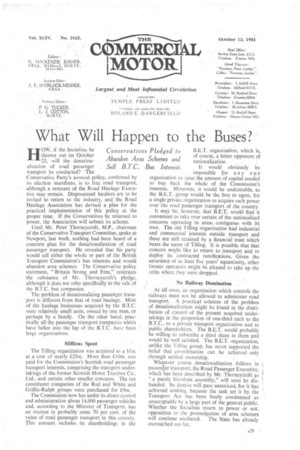What Will Happen to the Buses?
Page 31

If you've noticed an error in this article please click here to report it so we can fix it.
Conservatives Pledged to Abandon Area Schemes and Sell B.T.C. Bus Interests
HOW, if the Socialists be thrown out on October 25, will the denationalization of road passenger transport be conducted? The Conservative Party's avowed policy, confirmed by its election manifesto, is to free road transport, . although a remnant of the Road 1-laulage Executive may remain. Dispossessed hauliers are to be invited to return to the industry, and the Road Haulage Association has devised a plan for the practical implementation of this policy at the proper time. If the Conservatives be returned to power, the Association will submit its scheme. Until Mr. Peter Thorneyeroft, M.P., chairman of the Conservative Transport Committee, spoke at -Newport, last week, nothing had been heard of a concrete plan for the denationalization of road passenger transport. He revealed that his party would sell either the whole or part of the British Transport Commission's bus interests and would abandon area schemes. The Conservative policy statement, "Britain Strong and Free," reiterates the substance of Mr. Thorneycroft's pledge, although it does not refer specifically tothe sale of the B.T.C. bus companies.
The problem of denationalizing passenger transport is different from that of road haulage. Most of the. haulage businesses acquired by the B.T.C. were relatively small units, owned by one man, or perhaps by a family. On the other hand; practically all the passetiger transport companies which have fallen into the lap of the B.T.C..have been large organizations.
Millions Spent The Tilling organization was acquired' as a blOc at a cost of nearly £25m. More than ElOni. was paid for the Commission's Scottish road passenger transport interests, comprising the transport undertakings of the former Scottish Motor Traction Co., _ Ltd., and certain other Smaller concerns. The ten constituent companies of the Red and White and Griffin-Ralph groups were purchased for £9m.
The Commission now has under its direct control and administration about 14,000 passenger vehicles and, according to the Minister of Transport, has an interest in probably some 70 per cent. of the value of road passenger transport in this country. This amount includes its shareholdings in the B.E.T. organization, which is, of course, a bitter opponent of nationalization.
It would obvionsly be impossible for any one organization to raise the amount of capital needed 'to buy back the whole of the Commission's interests. Moreover, it would be undesirable, as the B.E.T. group would be the first to agree, for a single private organization to acquire such power over the road passenger transport of the country. It may be, however, that B.E.T. would find it convenient to take over certain of the nationalized concerns operating in areas contiguous with its own. The old Tilling organization had industrial and commercial interests outside transport and these are still retained by a financial trust which bears the name of Tilling. It is possible that that concern might like to return to .transport and to deploy its contracted ramifications. Given the .assurance of at least five years' equanimity, other former operators might be pleased to take up the reins where they were dropped.
No Railway Domination • At all costs, an organization which controls the railways must not be allowed to administer road transport. A practical solution of the problem of denationalization might be found in the distribution of control of the present acquired undertakings in the proportion of one-third each to the • B.T.C., to a private transport organization and to Ipublic shareholders. The B.E.T. would probably be willing to subscribe a third share in them and would he well satisfied. The B.E.T. organization, unlike. the Tilling group, has never supported the belief that co-ordination can be achieved only through unified ownership.
Whatever course denationalization follows in passen'ier transport, the Road Passenger Executive, which has been described by Mr. Thorneyar4t as "a purely frivolous assembly,". will soon be disbanded. Its demise will pass unnoticed, for it has achieved nothing, because the task set it by the Transport Act has been freely condemned as unacceptable by a large part of the general public. Whether the Socialists return to power or not, opposition to the promulgation of area schemes will continue unabated. The State has already encroached too far.




















































































